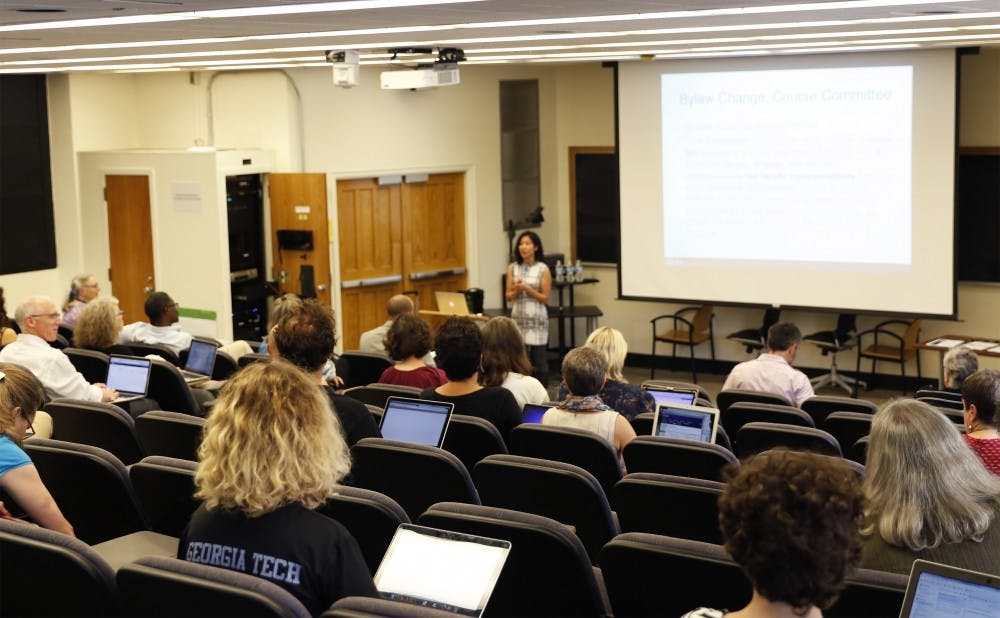The Arts and Sciences Council discussed an outline for a new curriculum and heard a proposal for a new undergraduate certificate at its meeting Thursday.
The council discussed a proposal from its Imagining the Duke Curriculum Committee for a new undergraduate curriculum called "Experience Duke Deliberately." The Arts and Sciences Council charged the IDC committee with reviewing the current curriculum and proposing changes. The proposed curriculum is comprised of four requirements and five expectations. The four requirements would include a major, depth in a second field—which could be a major, minor or certificate—a mentored scholarly experience and a new required course called the Duke Experience.
The five expectations—skills that Duke students will be expected to gain before their graduation—are to communicate coherently; understand other languages, cultures and civilizations; understand different forms of scientific thought and evidence; understand creative products of the human imagination; and evaluate, manage, and interpret information.
The last of these requirements—that all students complete a Duke Experience course their freshman year—was met with the most contention.
“The Duke Experience is a response to lots and lots of student input that we received," said Suzanne Shanahan, chair of the IDC and associate research professor of sociology, during the meeting. "They asked for a space to engage in a common set of questions and ideas....We’re imagining a common experience for students.”
Shanahan added that the committee was considering themes for the Duke Experience course, including race and inequality, climate change, economic development, artificial intelligence and mind and body.
"These are broad topics that faculty from different disciplines could provide a perspective on," she explained.
Jennifer Ahern-Dodson, assistant professor of the practice and director of outreach for the Thompson Writing Program, which was newly added to the council, expressed concern about the implication that the Duke Experience would replace Writing 101 in the curriculum.
“Among our peer-institutions, Duke would be alone in not having such writing requirements,” she said. “Students could graduate from Duke without any explicit writing class whatsoever, they would not be prepared for upper-division writing projects or the senior thesis, much less for intellectual contribution in graduate or professional schools.”
She concluded by proposing that the new curriculum incorporate both the Duke Experience and Writing 101.
“While the Duke Experience could be a valuable component of the curriculum, the curriculum must include a first-year writing component decoupled from the Duke Experience,” she said.
Michael Gillespie, professor of political science and philosophy and director of the Visions of Freedom FOCUS cluster, asked whether the Duke Experience course would hinder students from enrolling in the FOCUS program.
“We already have problems with the FOCUS program, with students who are pre-med and have a lot of other courses they want to do," he said.
Members of the council also expressed concerns with the second requirement of the new curriculum, which mandated that students pursue depth in an field separate from their major.
Associate Professor of Physics Christopher Walter argued that requiring students to pursue a second major, minor or certificate would limit their ability to gain exposure to a wide variety of disciplines.
Mohamed Noor, Earl D. McLean professor of biology and a member of the IDC committee, responded that students would still have multiple credits left for exploring alternatives even if they were required to pursue a second area of depth.
“If you look at the numbers, even if you take one of the heavy majors with 19 credits of requirements and pre-requirements and take one of the certificates—let’s say a high 6 credits—and add Duke Experience, that brings the total to 26 credits," he explained. "Duke requires 32 credits, so even with these requirements, they still have multiple courses left to explore.”
The council also heard a proposal to create a new undergraduate certificate. David Schaad, professor of the practice of civil and environmental engineering, proposed a Global Development Engineering certificate to the council, which would be sponsored by the Pratt School of Engineering's civil engineering department.
“Its goal is to provide a cohesive curricular pathway to train engineers who are able to address technical and structural issues related to poverty, wealth and equality, health, economic intolerance and such," said Anita Layton, chair of the council and Robert R. and Katherine B. Penn associate professor of mathematics, during the meeting. "It will comprise a number of gateway courses, a number of capstone courses and it also has a requirement for an experiential component."
The council voted on the certificate proposal during its meeting, but the results of the vote have not been released yet.
In other business:
The Arts and Sciences Council has traditionally put aside a portion of its funds to support faculty research. In the past these funds were only accessible by regular rank faculty, but this year the council is extending its support to non-regular rank faculty as well.
Get The Chronicle straight to your inbox
Signup for our weekly newsletter. Cancel at any time.

